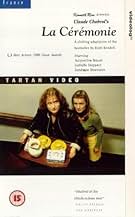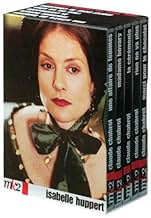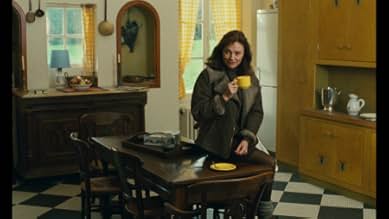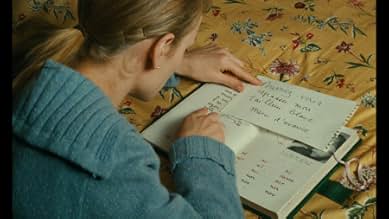La cérémonie
- 1995
- Tous publics
- 1h 51m
IMDb RATING
7.5/10
15K
YOUR RATING
A newly hired maid for a rich countryside family befriends a post-office clerk who encourages her to rebel against her employers.A newly hired maid for a rich countryside family befriends a post-office clerk who encourages her to rebel against her employers.A newly hired maid for a rich countryside family befriends a post-office clerk who encourages her to rebel against her employers.
- Awards
- 9 wins & 11 nominations total
Featured reviews
I love Sandrine Bonnaire. Not love her in the "sell my possessions and move to Paris" love her, but love her in movies. In this movie especially. Every second she is on the screen, I was riveted to her. Her somewhat jerky and stiff physical mannerisms, her plain but beautiful face. And even though from the start we sense that her character is odd, creepy even, we can also feel her almost childlike panic and pain early on when we learn she can't read. It's enormously moving, and it creates a sympathetic bond with her that complicates how we view the events that follow. I just love her, and that probably clouded my overall estimation of the film. That's not to say the film is otherwise weak. It's not. The exploration into the class conflict between the rich and their help was excellent. And so was the portrayal of the sociopathic personality, shifting from sweet smiles to cold-bloodedness in a process devoid of emotion. Chilling, especially so when the sociopath is a waifish beauty. It's a very good movie made great by Sandrine Bonnaire's performance.
Claude Chabrol, one of the leading lights of the French New Wave, faded into a series of unimaginative throwaway flicks and obscurity (peppered with moments of worthiness such as Blood Sisters )until storming once again into the limelight with this claustrophobic psycho-thriller adaptation.
Like Heavenly Creatures and Fun this film is anchored around the destructively intense relationship between two female leads: the apparently insipid family housemaid Sophie (Sandra Bonnaire) and the sparky but cumulatively obnoxious postmistress Jeanne (Isabelle Huppert). They both, it transpires, have potentially murderous secrets in their past involving the incineration of unwanted relatives (a child and a father). After a roundabout, deliberately vague "confession" to each other they erupt into childish laughter and it seems their relationship is cemented in their mutual utter lack of remorse.
There is no guilt felt by either woman for any of their crimes be it spite, neglect, theft, opening other's mail, arson or even murder. This is because, primarily though Jeanne's obsessive class angst and Sophie's obsessive paranois, they justify their stance and actions with an "us against them the world" self-righteous fervour. Jeanne describes all her - increasingly erratic - behaviour as "a good deed" and the equaly unstable Sophie believes her.
Every role is acted impeccably by some of the leading lights of French cinema. Along with Bonnaire and Huppert, arguably the best French actresses working today, Jacqueline Bisset plays the bourgeouse lady of the house for whom Jeanne works. She sees herself as a kind and understanding employer, providing glasses and a television for her taciturn domestic. However this gesture is interpreted as patronising by the illiterate Jeanne.
It's through minot details such as this that character exposition arises . The two principals are painted with tiny, finely detailed brushstrokes while everyone around them is painted with broad strokes. This intentional disparity brings us uncomfortably closer to the unhinged worlds of Jeanne and Sophie. Worlds which are revealed slowly, subtly and manipulatively.
La Ceremonie is based of a Ruth Rendell novel, "Judgement in Stone". Rendell is an archetypal British writer and I think that if La Ceremonie was a British film with British actors and a skilful British director it would have been a very different, darker and more disturbing movie. Having said this, Chabrol, with his distinctly French sensibilities and post nouvelle vague expertise brings other qualities to the story and makes this a remarkable film. Chabrol avoided darkness for the sake of it in favour of a highly sophisticated level of characterisation and build-up. The climax, however it was filmed, could never be anything less than shocking.
Ultimately la Ceremonie presents a pessimistic view of humanity: bleak, depressing and disturbing. Even Bisset's family don't come off well with their selfishly consumereist and blinkered middle class lifestyles.This and the high degree of audience manipulation means the film leaves a bad taste in the mouth but there's no denying it's an egregious work of art.
Like Heavenly Creatures and Fun this film is anchored around the destructively intense relationship between two female leads: the apparently insipid family housemaid Sophie (Sandra Bonnaire) and the sparky but cumulatively obnoxious postmistress Jeanne (Isabelle Huppert). They both, it transpires, have potentially murderous secrets in their past involving the incineration of unwanted relatives (a child and a father). After a roundabout, deliberately vague "confession" to each other they erupt into childish laughter and it seems their relationship is cemented in their mutual utter lack of remorse.
There is no guilt felt by either woman for any of their crimes be it spite, neglect, theft, opening other's mail, arson or even murder. This is because, primarily though Jeanne's obsessive class angst and Sophie's obsessive paranois, they justify their stance and actions with an "us against them the world" self-righteous fervour. Jeanne describes all her - increasingly erratic - behaviour as "a good deed" and the equaly unstable Sophie believes her.
Every role is acted impeccably by some of the leading lights of French cinema. Along with Bonnaire and Huppert, arguably the best French actresses working today, Jacqueline Bisset plays the bourgeouse lady of the house for whom Jeanne works. She sees herself as a kind and understanding employer, providing glasses and a television for her taciturn domestic. However this gesture is interpreted as patronising by the illiterate Jeanne.
It's through minot details such as this that character exposition arises . The two principals are painted with tiny, finely detailed brushstrokes while everyone around them is painted with broad strokes. This intentional disparity brings us uncomfortably closer to the unhinged worlds of Jeanne and Sophie. Worlds which are revealed slowly, subtly and manipulatively.
La Ceremonie is based of a Ruth Rendell novel, "Judgement in Stone". Rendell is an archetypal British writer and I think that if La Ceremonie was a British film with British actors and a skilful British director it would have been a very different, darker and more disturbing movie. Having said this, Chabrol, with his distinctly French sensibilities and post nouvelle vague expertise brings other qualities to the story and makes this a remarkable film. Chabrol avoided darkness for the sake of it in favour of a highly sophisticated level of characterisation and build-up. The climax, however it was filmed, could never be anything less than shocking.
Ultimately la Ceremonie presents a pessimistic view of humanity: bleak, depressing and disturbing. Even Bisset's family don't come off well with their selfishly consumereist and blinkered middle class lifestyles.This and the high degree of audience manipulation means the film leaves a bad taste in the mouth but there's no denying it's an egregious work of art.
Based on Ruth Rendell's Judgment in Stone, French auteur Claude Charbol transplanted this quintessentially English thriller about class and guilt to France, where he can fire more bullets at his favorite target - the French bourgeoisie. Without giving too much away, the story unfolds at a slow pace to reveal the class divisions and complex psychological issues that drive the characters' motivations. Centring on an illiterate maid, Sophie, who goes to desperate lengths to hide her "disability" from her employers, the wealthy Lelievre family, she eventually strikes a bond with the local postmistress who has mysterious grudge against her friend's employers. This film provided Chabrol with plenty of opportunities to criticize the disaffected bonhomie of the Levlievre family, but at times his presentation of some members of the Levlievres actually enlists our sympathy and therefore strikes a blow to the validity of his critique of French bourgeoisie values. Perhaps this was his intent to create more ambiguity than most psychological thrillers in this genre would allow. It's worth watching for the climax alone which has a delicious twist worthy of a mass-market Hollywood sequel.
I see this movie for the third time and can't prevent myself to notice the pure Claude Chabrol style in the critic of the rich people, especially in the province. But the ending is very bloody and surprising too. And in the mean time, since my last viewing, I saw PARASITES and I can't also prevent myself to see a thin line between the two features. If you have seen both features, you see what I mean. A pure delight.
In this character study of two hateful middle-aged women (not so middle-aged in the movie, however, as in the novel by Ruth Rendell) we are made to fathom the bad that may befall the good.
Claude Chabrol's direction is clean, crisp and uncluttered--which isn't always the case, witness his Madame Bovary (1991), which is a bit too leisurely and L'Enfer (1993) which muddles a whole lot. Maybe it's the editing. Anyway this is more like his quietly brilliant Une affaire de femmes (1988) with a fine script and striking performances by Sandrine Bonnaire and Isabelle Huppert, handsomely supported by Jacqueline Bisset, Jean Pierre Cassel and the very pretty Virginie Ledoyen.
Bonnaire plays Sophie, an intense taciturn woman harboring dark secrets, whom the Leliévres have hired to cook and keep house at their country home. Bisset is Catherine Leliévre and Cassel her husband. They exist in bourgeois heaven avec matrimonial bliss with two teenagers, a family so closely knit and so charmingly together that they watch a two-part production of Mozart's Don Giovanni on TV, just the four of them cosily on the couch.
Well, this sort of unobtainable happiness doesn't sit well with Jeanne (Huppert) who is a lowly postal clerk living alone whose past includes the (accidental?) killing of her four-year-old daughter. Jeanne takes a fancy to the Leliévre's strange new maid with the idea of showing her something besides work. They strike up a fateful friendship that we know is leading to something horrible.
Huppert is as good as I've seen her, which is very good indeed. She is particularly striking here in an uncharacteristic role as a spiteful, working class woman with a heart of vengeance against anybody better off than she is. There is just a touch of sly irony in her performance suggesting that she is having a particularly good time playing the nasty. Bonnaire's stark performance as the unbalanced and humorless, reclusive Sophie will remain etched in your brain. Apart they are like inert, harmless chemicals. Together they catalyze one another and become brazen and explosive.
The story, filled with little foreshadowing of the tragedy to come, gilds the lily of our tristesse by making the Leliévres so very, very nice. We are reminded of the violent hatred by the proletariat toward the privileged classes, in this case acted out by two loonies against an innocent, but representative family, echoing not only the Russian Revolution but even more so the French Revolution, now two hundred years old.
What I am trying to figure out why this is called La Cérémonie. Maybe it is a ceremony of execution.
(Note: Over 500 of my movie reviews are now available in my book "Cut to the Chaise Lounge or I Can't Believe I Swallowed the Remote!" Get it at Amazon!)
Claude Chabrol's direction is clean, crisp and uncluttered--which isn't always the case, witness his Madame Bovary (1991), which is a bit too leisurely and L'Enfer (1993) which muddles a whole lot. Maybe it's the editing. Anyway this is more like his quietly brilliant Une affaire de femmes (1988) with a fine script and striking performances by Sandrine Bonnaire and Isabelle Huppert, handsomely supported by Jacqueline Bisset, Jean Pierre Cassel and the very pretty Virginie Ledoyen.
Bonnaire plays Sophie, an intense taciturn woman harboring dark secrets, whom the Leliévres have hired to cook and keep house at their country home. Bisset is Catherine Leliévre and Cassel her husband. They exist in bourgeois heaven avec matrimonial bliss with two teenagers, a family so closely knit and so charmingly together that they watch a two-part production of Mozart's Don Giovanni on TV, just the four of them cosily on the couch.
Well, this sort of unobtainable happiness doesn't sit well with Jeanne (Huppert) who is a lowly postal clerk living alone whose past includes the (accidental?) killing of her four-year-old daughter. Jeanne takes a fancy to the Leliévre's strange new maid with the idea of showing her something besides work. They strike up a fateful friendship that we know is leading to something horrible.
Huppert is as good as I've seen her, which is very good indeed. She is particularly striking here in an uncharacteristic role as a spiteful, working class woman with a heart of vengeance against anybody better off than she is. There is just a touch of sly irony in her performance suggesting that she is having a particularly good time playing the nasty. Bonnaire's stark performance as the unbalanced and humorless, reclusive Sophie will remain etched in your brain. Apart they are like inert, harmless chemicals. Together they catalyze one another and become brazen and explosive.
The story, filled with little foreshadowing of the tragedy to come, gilds the lily of our tristesse by making the Leliévres so very, very nice. We are reminded of the violent hatred by the proletariat toward the privileged classes, in this case acted out by two loonies against an innocent, but representative family, echoing not only the Russian Revolution but even more so the French Revolution, now two hundred years old.
What I am trying to figure out why this is called La Cérémonie. Maybe it is a ceremony of execution.
(Note: Over 500 of my movie reviews are now available in my book "Cut to the Chaise Lounge or I Can't Believe I Swallowed the Remote!" Get it at Amazon!)
Did you know
- TriviaThe author Ruth Rendell has said that Claude Chabrol's version of her novel "A Judgement in Stone" is one of the few film adaptations of her work that she is happy with.
- Quotes
Georges Lelievre: [referring, respectively, to Sophie the illiterate maid and Jeanne the nosy postal clerk] What a pair: one can't read at all, and the other reads our mail.
- ConnectionsFeatured in Isabelle Huppert: Message personnel (2020)
- SoundtracksCello Symphony
Composed by Benjamin Britten
Details
- Release date
- Countries of origin
- Official site
- Language
- Also known as
- The Ceremony
- Filming locations
- Production companies
- See more company credits at IMDbPro
Box office
- Gross US & Canada
- $873,196
- Gross worldwide
- $873,196
- Runtime1 hour 51 minutes
- Color
- Sound mix
- Aspect ratio
- 1.66 : 1
Contribute to this page
Suggest an edit or add missing content


![Watch Bande-annonce [OV]](https://m.media-amazon.com/images/M/MV5BNzliMDEwMzYtMjg1NS00Mjc1LTkwNDktMzc1MmJkNDJjZDIxXkEyXkFqcGdeQXRyYW5zY29kZS13b3JrZmxvdw@@._V1_QL75_UX500_CR0)




























